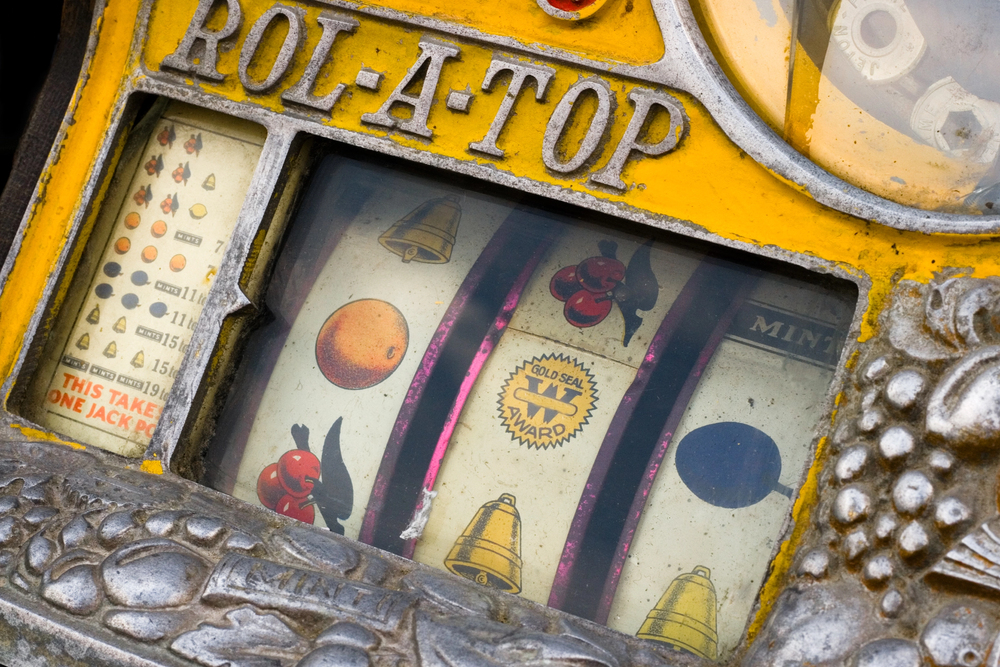
History of Slot Machines
Discover the evolution of slot machines from mechanical to digital.
- Learn about the key innovations
- Explore iconic machines like the Liberty Bell
- Understand modern slot mechanics
- See how gambling laws impacted development
Delve into the origins, evolution, and cultural significance of the one armed bandit, a staple of casino gaming.
The one armed bandit is an iconic gambling machine that has captivated players for over a century. This nickname refers to the traditional slot machines characterized by their distinctive mechanical lever positioned on the side, which players would pull to spin the reels. The term "one-armed" derives from the single lever resembling an arm, while "bandit" reflects the machine's notorious ability to drain players' wallets with its unfavorable odds. From dimly lit saloons to glittering modern casinos, the one armed bandit has become synonymous with gambling itself, representing both the allure of chance and the risk of financial loss. Its evolution from a simple mechanical novelty to sophisticated electronic gaming machines demonstrates its enduring significance in entertainment culture.
The ancestry of the one armed bandit traces back to two competing innovations in the early 1890s. The first slot machine was invented in Brooklyn in 1891 by Sittman & Pitt, who designed a poker-based machine containing five drums holding 50 card faces. However, the more recognizable Liberty Bell machine—the true progenitor of modern slot machines—emerged between 1887 and 1895, created by Charles Fey, a German mechanic based in San Francisco. Fey's Liberty Bell featured three spinning reels with five symbols: horseshoes, diamonds, spades, hearts, and the Liberty Bell itself, which gave the machine its distinctive name.
The nickname "one-armed bandit" originated from two specific characteristics. The "one-armed" designation came directly from the large mechanical lever affixed to the side of early machines that players would pull to initiate spins. Players would insert a coin, grasp the lever, and pull it downward like an arm to set the reels in motion. The term "bandit" emerged because the machines were notorious for collecting players' money with remarkably poor odds—players lost money far more often than they won, earning the machines their unsavory reputation as thieves of players' cash.
The Liberty Bell's revolutionary feature was its fully automated payout system. Unlike Sittman & Pitt's earlier machine, which required a bartender or saloon owner to distribute prizes manually, the Liberty Bell could automatically dispense winnings—up to ten nickels for a row of three bells. This automation proved transformative, allowing machines to operate independently and sparking rapid proliferation throughout the United States.
By the early 20th century, one armed bandits had become ubiquitous in America, appearing in bowling alleys, barber shops, tobacconists, and saloon bars. Charles Fey's success was so overwhelming that he opened the Slot Machine Factory in 1896, producing variations like the 4-11-44 and Card Bell machines.
The next major evolution came in 1963 when Bally unveiled Money Honey, the first fully electromechanical slot machine. This machine represented a watershed moment—it was the first slot machine featuring a bottomless hopper and automatic payout of up to 500 coins without requiring an attendant. Though Money Honey retained the mechanical lever initially, it represented the beginning of the end for the purely mechanical one armed bandit. As electromechanical technology advanced, the side lever became increasingly vestigial, eventually abandoned entirely in favor of push buttons.
The transition to video slot machines occurred in 1976 when Fortune Coin Co. developed the first video slot machine in Kearny Mesa, California, using a modified 19-inch Sony Trinitron color receiver for display. After Nevada State Gaming Commission approval, video slots gained popularity on the Las Vegas Strip, and Fortune Coin's technology was purchased by International Gaming Technology (IGT) in 1978.
Playing the traditional one armed bandit was straightforward, though the mechanics varied based on the machine type. With Sittman & Pitt's poker machine, players would insert a coin into the slot and pull the mechanical lever to spin five reels containing 50 card faces. The objective was to land winning poker hands. However, the machines were deliberately rigged—the ten of hearts and jack of spades were omitted from the reels, making a royal flush twice as difficult to achieve.
Fey's Liberty Bell offered simpler gameplay: insert a coin, pull the lever, and watch three reels spin containing five symbols. Matching combinations—particularly three Liberty Bells—would trigger an automatic payout. In early machines, smaller payouts like pairs or three of a kind might win a drink or cigar, while larger wins earned cash prizes.
Explore the technological advancements and cultural influence of the one armed bandit, tracing its transition from mechanical contraptions to digital experiences.
Understand the mechanics and appeal of the one armed bandit, from vintage slot machines to video gaming adaptations.

Players initially believed they were playing a game of skill, pulling the lever with strategic timing. In reality, the random placement of symbols on the reels made it purely a game of chance, similar to modern slot machines.
The unfortunate reality is that the one armed bandit, by design, offers no legitimate strategy for winning. The machines were mechanically programmed with house odds overwhelmingly favoring the operator. Historical records indicate that slot machines from the 1930s typically had payback rates around 50% when functioning normally—meaning players retained only half their money. When machines were "bugged" (rigged), players lost even faster.
The only genuine "strategy" was the most obvious one: play infrequently and with money you could afford to lose completely. The machines were engineered as revenue generators for bar owners, saloon keepers, and later casino operators, not as fair games offering players realistic winning opportunities. Understanding that one armed bandits were fundamentally designed to extract wealth rather than distribute it was the most honest approach to engaging with them.
The transition from mechanical one armed bandits to digital platforms has democratized access to slot machine gaming. Online casinos now offer virtual versions of classic one armed bandit machines, allowing players to experience the nostalgia of traditional slots from their computers and mobile devices. These digital versions retain the aesthetic elements of mechanical machines—the lever imagery, the spinning reels, and the bell symbols—while incorporating modern graphics, multiple paylines, and enhanced features.
Modern online slots have exponentially expanded the gaming experience beyond the simple three-reel format. Today's typical online slot games feature five reels with 40 or more ways to win, compared to the single payline of Fey's original Liberty Bell. Progressive jackpots, bonus rounds, and themed variations allow online platforms to offer experiences impossible with purely mechanical machines.
Beyond online casino platforms, the one armed bandit concept has inspired video game developers to create innovative gaming experiences. Most notably, the roguelite deck-building video game titled "One Armed Bandit" has brought the concept into the broader gaming ecosystem. This game reinterprets the one armed bandit metaphor through modern game design, typically featuring strategic deck-building mechanics combined with chance-based elements reminiscent of traditional slot machines. Rather than mindlessly pulling a lever, players engage with strategic decisions about which cards or abilities to include in their deck before encountering randomized encounters, blending skill-based strategy with fortune-dependent outcomes.
The one armed bandit represents a remarkable chapter in entertainment and gambling history. From Charles Fey's ingenious Liberty Bell machine in the 1890s to modern electromechanical and video slot machines, this gaming device has evolved continuously while maintaining its essential character. The term itself—derived from the mechanical lever and the machine's relentless extraction of player funds—remains emblematic of both the allure and danger of gambling.
Understanding the one armed band's journey illuminates broader shifts in technology, regulation, and entertainment. The machines that once dominated American saloons and Nevada arcades have transformed into sophisticated online platforms and inspired innovative video game designs, yet the fundamental mechanics of chance remain unchanged. Whether encountered in historical museum displays, vintage casino collections, or reimagined in digital formats, the one armed bandit continues to fascinate as a symbol of fortune, risk, and the enduring human attraction to games of chance. Its legacy extends far beyond gambling—it represents a pivotal moment when mechanical engineering met entertainment, creating an icon that resonates across generations.
We are backed by some of the leading names in the casino and gaming industry, highlighting our reach and reliability.





Discover the evolution of slot machines from mechanical to digital.

Investigate how traditional games are adapted for online platforms.
Explore the latest online slot games with cutting-edge graphics and themes.
Understand the recent changes in casino regulations and their impact on gambling.
Discover new strategies for improving your chances in both online and offline casinos.